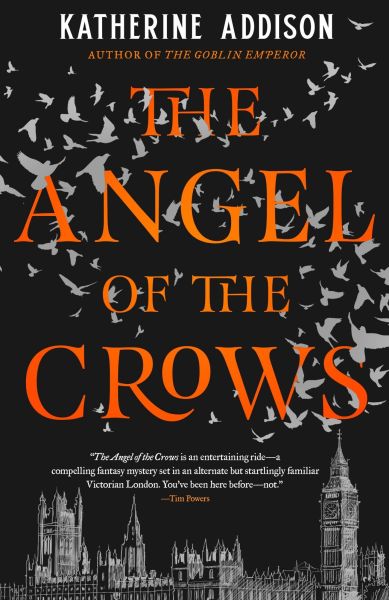When the World Comes In
The Angel of the Crows
By Katherine Addison

21 Oct, 2020
Katherine Addison’s 2020 The Angel of the Crows is a standalone gas-lamp fantasy.
Near-fatally savaged by a fallen angel encountered in Afghanistan, Dr. J. H. Doyle, late of Her Majesty’s Imperial Armed Forces Medical Corps, returns home to England. Doyle’s pension is small; living alone will be impossible. Doyle is forced to look for a flatmate. Doyle is painfully aware that it will be an odd flatmate indeed who will be able to tolerate the doctor’s quirks.
Odd flatmate found: Crow, a consulting detective. Crow is also an angel.
Crow is the one known angel who is not tied to a specific building. The loss of habitation generally means either the loss of identity, will, and memory — effectively death — or worse, a fall into homicidal derangement. Crow has ingeniously found a middle path, one that frees the angel to wander London without becoming the sort of monster who attacked Doyle.
Being an eccentric, the angel is willing to accept eccentricity in a human companion. Doyle came home from Central Asia with a metaphysical malady to go with the lame leg. Others might insist Doyle register as required by law. Crow accepts that from time to time Doyle suffers a relapse.
Doyle isn’t Crow’s primary hobby, as much as the angel values their companion. Crow lives to solve mysteries, one reason why he can cling to personhood when other angels lose themselves and fade away. Providentially for Crow and Doyle, London is full of mysteries.
~oOo~
A note about the title: it’s not The Goblin Emperor. This is because this book is not The Goblin Emperor but an entirely different book. I mention this only because some reviewers seem confused on that point. Onward!
This is a novel, or at least it was published in one go (as far as I know). Oddly enough, it has the feel of a fix-up, thanks to the episodic narrative. This is perhaps because (as acknowledged in the author’s note) this book began as Sherlock fanfiction. Hmmm … I would have guessed on the basis of one or two details that it was Elementary fanfic. Perhaps the most significant difference between Sherlock’s Sherlock and Crow is that Addison firmly rejects the heroic asshole trope so beloved by Moffat and Gatiss and so many others. This is a happy change that meant I actually finished the book rather than heaving it out a window, as I might have done had the novel featured yet another self-satisfied abusive sociopath.
With the exception of Jack the Ripper mystery, the cases themselves are styled closely on Arthur Conan Doyle’s Sherlock Holmes cases, albeit less closely as the book progresses. People who are familiar with the books or the better adaptations (1) will be able to make educated guesses as to where each case is heading.
Even if it’s episodic, the intriguing characters and worldbuilding are enough to carry the novel. Crow may be a consulting detective, but aside from his need for interesting cases, Crow is not Sherlock Holmes; the angel is a supernatural being. Similarly, Doyle may be Crow’s Watson, but despite some similarities in background, Doyle is very much not John Watson.
And yet … the pairing works. The relationship between inhuman Crow and no longer fully human Doyle is the heart of the book. Which is, as anyone who has read the works that inspired this novel would acknowledge, is the way it should be. Without engaging characters at the heart of the story, mysteries are just puzzles. This is more.
The Angel of the Crowsis available here (Amazon US), here (Amazon Canada), here (Amazon UK), here (Barnes & Noble), here (Book Depository), and here (Chapters-Indigo).
1: In the list of better adaptations I am not including Sherlock. I didn’t find it as dreadful as other Moffat works, but then, Covid-19 is not as terrifying as monsters from the beyond that extract bones without breaking the skin. I am sure future generations will agree that it is the nadir of Holmes adaptations. You disagree? Hie thee to the comments.
